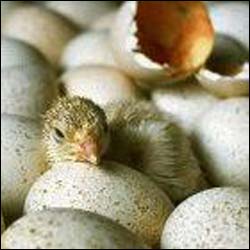Brazilians sequence genes of pig and poultry killers

The two Mycoplasma species cost pig and poultry farmers millions each year. Photo Credit: USDA
Brazilian researchers have sequenced the genomes of two bacteria that cause significant damage to pig and poultry farming in Brazil and elsewhere.
The researchers are now analysing the results in an attempt to identify bacterial proteins that could be used to develop vaccines and diagnostic kits against the bacteria.
Mycoplasma hyopneumoniae causes pneumonia in pigs and costs the Brazilian pig-breeding industry US$200 million each year. Mycoplasma synoviae is a related bacterium that causes respiratory disease in chickens and turkeys.
The researchers also identified the genetic sequence of a non-pathogenic strain of Mycoplasma hyopneumoniae in order to compare it to the pathogenic strain and determine which genes and proteins help the bacterium kill pigs.
Edmundo Grisard of the Federal University of Santa Catarina told SciDev.Net that the scientists identified several interesting targets for future research in this way.
Grisard and 90 other researchers from 25 Brazilian laboratories published the sequencing results in the latest issue of Journal of Bacteriology.
Brazil is the world’s second biggest producer of chicken meat. According to the Brazilian Agricultural Research Corporation (Embrapa), which participated in the sequencing study, Brazil produces 7.5 millions tonnes of it each year.
Media Contact
More Information:
http://www.zds-bonn.de/index.php?section_1&category=0&page=2All latest news from the category: Agricultural and Forestry Science
Newest articles

Silicon Carbide Innovation Alliance to drive industrial-scale semiconductor work
Known for its ability to withstand extreme environments and high voltages, silicon carbide (SiC) is a semiconducting material made up of silicon and carbon atoms arranged into crystals that is…

New SPECT/CT technique shows impressive biomarker identification
…offers increased access for prostate cancer patients. A novel SPECT/CT acquisition method can accurately detect radiopharmaceutical biodistribution in a convenient manner for prostate cancer patients, opening the door for more…

How 3D printers can give robots a soft touch
Soft skin coverings and touch sensors have emerged as a promising feature for robots that are both safer and more intuitive for human interaction, but they are expensive and difficult…





















